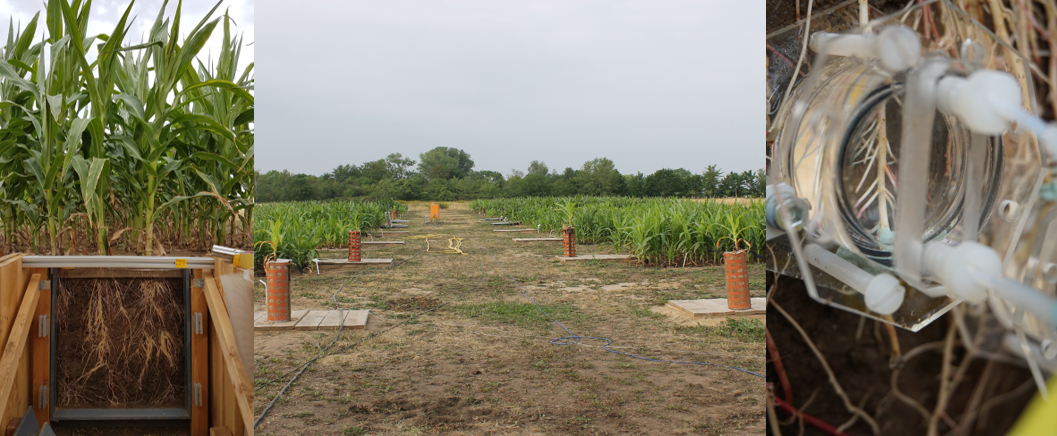P11 - Exudate Dynamics
The mystery of root exudation – how do exudation sampling strategies and changing environmental conditions affect root exudation?

Root exudates (i.e. primary & secondary metabolites released by roots) are key drivers of plant-microbe-soil interactions. In the past, root exudation was mostly studied in nutrient solution culture (hydroponic). Despite the operational benefit of hydroponics, the question remains how ecologically relevant exudation results obtained under hydroponic conditions are compared to soil environments.
In phase 1, we characterized maize root exudation in the two, priority program 2089 specific, experimental platforms (SCE & SPE) and additionally evaluated the effect of different plant growth and exudation sampling approaches (soil vs hydroponic, lab vs field) demonstrating the importance of soil-based exudation techniques, particularly in the context of plant-microbe-soil-interactions. In phase 2, we now set out to reveal the effect of soil environmental changes on maize (Zea mays WT & rth3) root exudation with particular focus on drought and changes in soil structural properties, which have both been identified as major factors driving rhizosphere pattern formation. We will also investigate seasonal differences in exudation in the field and evaluate a potential soil legacy effect induced by several years of maize monoculture. Combining soil-based exudation sampling approaches with non-targeted metabolomic analysis by UHPLC-QTOFMS and GC-QTOFMS we aim to uncover the entire diversity of exudates released. Our results will provide important mechanistic insights on how root exudation is altered under changing growth conditions. Furthermore, we will deliver key information for all exudation-driven rhizosphere processes that will be investigated by other participants within the PP 2089 und significantly contribute to merge individual parameter patterns and holistically decipher the spatiotemporal interplay of rhizosphere processes.
Outcome
Our project investigated the spatial and temporal dynamics of root exudation in maize (Zea mays L.), focusing on genotypic differences in root hair development, soil physical properties and environmental conditions. Using soil-based sampling approach, we collected exudates from field-grown plants at different growth stages, demonstrating that plant developmental stage is the primary factor influencing root exudation patterns with soil texture and genotype playing a significant but minor role in the observed exudation patterns. Carbon (C) exudation increased with biomass accumulation but decreased per unit root surface area as plants matured indicating a shift in below-ground C allocation with plant development.
Focusing on drought, we found that it significantly altered exudation patterns in a soil column experiment, particularly in WT plants, which experienced greater stress due to their larger biomass and increased exudation of osmolytes such as sugars and amino acids. A similar experiment assessing soil physical properties showed that bulk density and texture had minimal effects on root exudation.
To study how seasonal variation and long-term maize monoculture affect root exudation, we conducted a field experiment using soil columns containing decaying roots from the previous growing season. Despite these conditions, our results showed no significant differences in exudation patterns between seasons (BBCH19 2019 vs 2022) and no evidence of a legacy effect on exudation dynamics, suggesting that previous root residues did not influence exudation in subsequent plant growth cycles.
We also examined the spatial distribution of exudates along the root axis and confirmed that root tips showed higher exudation rates than older root tissues. However, due to their relatively small surface area, their contribution to total plant exudation was limited. Older root tissues maintained a constant basal exudation level, ensuring continuous interactions with soil microbes.
A comparison of different experimental setups (hydroponic vs. soil-based systems) showed that system choice influenced exudation results, potentially masking genotypic differences. However, when growth temperatures were comparable, exudation patterns observed for soil-based laboratory setup closely resembled those observed in the field.
Overall, our results illustrate how maize plants adapt their exudation patterns in response to developmental, environmental and genetic factors.
Link to English scientific abstract
Link to German scientific abstract
